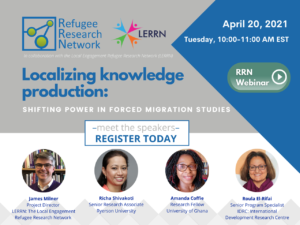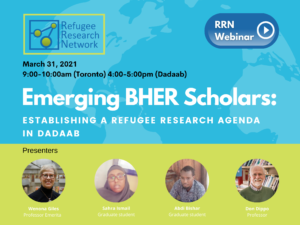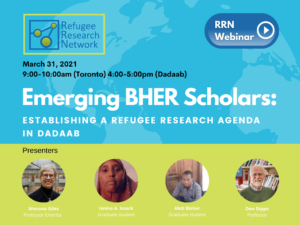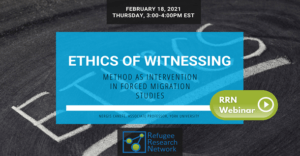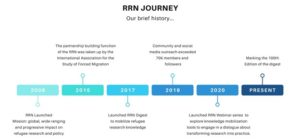The RRN Research Digest provides a synopsis of recent research on refugee and forced migration issues from entities associated with the RRN and others.
You can download the digest in PDF format here: RRN Research Digest No. 107
Recent Publications and New Research
Biorklund Belliveau, L., & Ferguson, R. (2021). Normalising the Exceptional: The Use of Temporary Protection in Transit Countries to Externalise Borders and Responsibilities. Geopolitics, 1-31. Temporary protection is increasingly presented as a ‘novel approach’ to displaced people that have crossed an international border as it can provide a level of protection and access to basic social services for a defined period. This paper calls into question the objectives of such measures by highlighting the geopolitical context in which they operate. The authors argue that while temporary arrangements, particularly in so-called ‘transit’ countries, may address the humanitarian needs of displaced people, they also embed precarity and temporality into protection norms. Combined with policies that externalize migration management, they risk normalising the exclusion of individuals from avenues to permanent protection in a country that they feel safe.
Papadopoulos, R.K. (2021). Involuntary Dislocation. Home, Trauma, Resilience and Adversity-Activated Development. London and New York: Routledge. This book identifies involuntary dislocation as a distinct phenomenon, challenging existing assumptions and established positions, and explores its linguistic, historical, and cultural contexts. The author elaborates on key themes, including home, identity, nostalgic disorientation, the victim, and trauma, providing an in-depth understanding of each contributing factor while emphasizing the human experience throughout. This book concludes by articulating an approach to conceptualizing and working with people who have experienced adversities engendered by involuntary dislocation, and with a reflection on the language of repair and renewal.
Bakardjieva, M. (2020). “Say It Loud, Say It Clear…”: Concerting solidarity in the Canadian Refugees Welcome Movement (2015–2016). Canadian Review of Sociology, 57(4), 632–655. This article reports the results of a multimethod case study that seeks to explain how collective action frames emerged in the Canadian Refugees Welcome Movement context. The author explores which actors were involved in their articulation, how they generated a following and collective action, and the humanitarian and political effect. The focus is on the discursive processes of construction of solidarity across differences as they unfolded in the social media environment. The author argues that the Facebook event pages calling for rallies in support of Syrian refugees served as a discursive space that helped transform the moral shock experienced by members of distinct communities into the construction of solidarity and collective action across differences.
Tastsoglou, E. (2021). Twenty-First Century “New” Greek Transnational Migration to Canada. Journal of Immigrant & Refugee Studies, 1-14. This article derives from a qualitative study of the “new” migration from Greece to Canada, resulting from a severe socioeconomic crisis in Greece. Starting from the migration narratives of 20 “new” Greek migrants in Halifax and Toronto, this research focuses on how the “new” migrants make and carry out the decision to leave and immigrate to Canada. A heuristic use and reconceptualized understanding of the classic “push-pull” model, in conjunction with a transnational migration perspective, allows mapping out, through rich qualitative data, the structure—agency articulation in the “out-of-Greece-and-into-Canada” mobility of 21st century “new” Greek migrants.
Reports, Policy Briefs and Blogposts
Issue Brief: A Crisis of Care: Sexual and Reproductive Health Competes for Attention Amid Conflict and Displacement in Mali, Devon Cone and Alexander Lamarche, April 15, 2021, Refugees International. National healthcare systems rarely prioritize sexual and reproductive health (SRH), posing a challenge for women and girls worldwide, including in Mali. There, nearly a decade of conflict has created a protracted humanitarian crisis, decimating the healthcare system and limiting the availability of SRH services. Meanwhile, political uncertainty following a coup in August 2020 has focused international efforts on addressing security and stabilization, at the expense of humanitarian needs. The lack of donor funding has exacerbated the situation, including the dearth of SRH services. The challenges are particularly pressing for women and girls who have been forcibly displaced by conflict and instability.
Expert report: Access to Documents by Eritrean Refugees in the Context of Family Reunification, Sara Palacios Arapiles and Daniel R. Mekonnen, Equal Rights Beyond Borders and the International Refugee Assistance Project (IRAP). This report is concerned with challenges experienced by Eritrean refugees in Europe in the context of family reunification processes, specifically those relating to strict documentary requirements demanded by some EU Member States, in particular Germany. The report shows that these requirements often hinder the effectiveness of the right to family reunification. Further, such requirements pose unnecessary risks, often placing Eritrean refugees, and their relatives in Eritrea, at serious risk.
Recognizing the role of religious groups in refugee sponsorship by Geoffrey Cameron, Policy Options, March 31, 2021. This article outlines the key role of religious groups in private refugee sponsorship in Canada. The author briefly explains how Canada developed private refugee sponsorship; at the centre of this story is the creative and humanitarian role played by religious groups and coalitions. Religious groups continue to be leading actors within Canada’s resettlement programs, and the government must recognize their role to understand Canada’s humanitarian potential.
Digital and Social Media
RRN Webinar Series: Localizing Knowledge Production: Shifting power in forced migration studies, In collaboration with the Local Engagement Refugee Research Network (LERRN), April 20, 2021. Drawing on the results of a review of forced displacement research centres based in the global South and interviews with their directors, the speakers discussed ways to shift from focusing on research partnerships to an approach that supports the localization of knowledge production in refugee and forced migration studies. View the recording here.
LERRN-IDRC Webinar: Forced displacement and health in the context of the pandemic: Localized responses to COVID- 19’s impact on refugees, IDPs, and communities living in chronic displacement – May 20, 2021, 9:00-10:30AM. This webinar will examine what the experience of the COVID-19 pandemic reveals about how health systems respond to the health needs of the forcibly displaced and how social, cultural and economic factors and power relations shape responses. Drawing on lessons from Bangladesh, Syria, and Palestine, it will consider how localized actors and approaches can identify areas of innovation to improve access and health outcomes for refugees, IDPs and other forcibly displaced people. Learn more and register here.
Resource: Ethical Considerations in Research with People in Situations of Forced Migration, Canadian Council for Refugees. Your Rights in Research page on the CCR website has been updated to include the following languages:

